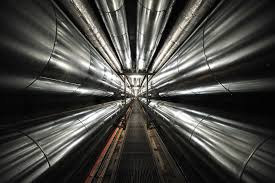
Breaking News
 The Government Is Not Your Family
The Government Is Not Your Family
 92 Percent Of Employed Americans Have Cut Back On Spending As The Standard Of Living...
92 Percent Of Employed Americans Have Cut Back On Spending As The Standard Of Living...
 Announcement! OuterrNet Communication Available For Free: Join The Revolution!
Announcement! OuterrNet Communication Available For Free: Join The Revolution!
 Will Trump Use US Military For Iran 'Regime Change' Operation
Will Trump Use US Military For Iran 'Regime Change' Operation
Top Tech News
 Superheat Unveils the H1: A Revolutionary Bitcoin-Mining Water Heater at CES 2026
Superheat Unveils the H1: A Revolutionary Bitcoin-Mining Water Heater at CES 2026
 World's most powerful hypergravity machine is 1,900X stronger than Earth
World's most powerful hypergravity machine is 1,900X stronger than Earth
 New battery idea gets lots of power out of unusual sulfur chemistry
New battery idea gets lots of power out of unusual sulfur chemistry
 Anti-Aging Drug Regrows Knee Cartilage in Major Breakthrough That Could End Knee Replacements
Anti-Aging Drug Regrows Knee Cartilage in Major Breakthrough That Could End Knee Replacements
 Scientists say recent advances in Quantum Entanglement...
Scientists say recent advances in Quantum Entanglement...
 Solid-State Batteries Are In 'Trailblazer' Mode. What's Holding Them Up?
Solid-State Batteries Are In 'Trailblazer' Mode. What's Holding Them Up?
 US Farmers Began Using Chemical Fertilizer After WW2. Comfrey Is a Natural Super Fertilizer
US Farmers Began Using Chemical Fertilizer After WW2. Comfrey Is a Natural Super Fertilizer
 Kawasaki's four-legged robot-horse vehicle is going into production
Kawasaki's four-legged robot-horse vehicle is going into production
 The First Production All-Solid-State Battery Is Here, And It Promises 5-Minute Charging
The First Production All-Solid-State Battery Is Here, And It Promises 5-Minute Charging
China Mass Production of Nuclear Thermal Power Could Reach 1 Cent per KWH

This is close to the one-cent target of the Anthropocene Institute. China is planning to build a lot of nuclear regular third-generation nuclear reactors and drive costs down by 40%. Learning to build Nth reactors cheaper could drive the costs of deep pool reactors to 1 cent per kilowatt-hour. Mass production and process improvements could then bring this solution to the one-cent per kwh target.
The cost projection is for a kilowatt-hour of thermal power but this heat can displace a large usage of coal. There is also a projection that China could mass-produce regular nuclear reactors for electrical power. The projection is that they could reduce costs by 40% from today's costs. This would get nuclear electric costs in 2030 to potentially less than 3 cents per kwh for electricity.
In 2014, the levelized cost of electricity (LCOE) in China was 4 cents per kwh for hydroelectric and other renewable energy (RE) power had costs ranging from 5 to 11 cents per kwh.
The nuclear district heaters will already be near the cost of traditional coal-fired boilers in China and around 40 percent of the cost to produce the same amount using a gas-fired boiler. China is not importing enough natural gas from Russia and other sources. A trade deal with the US would likely involve a lot of liquified natural gas which is more expensive.

 Storage doesn't get much cheaper than this
Storage doesn't get much cheaper than this

